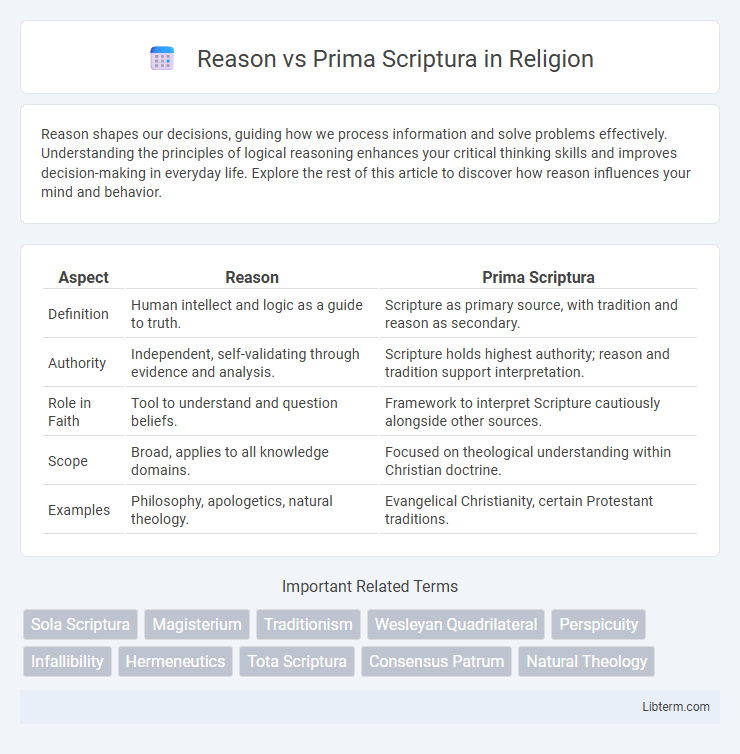Reason shapes our decisions, guiding how we process information and solve problems effectively. Understanding the principles of logical reasoning enhances your critical thinking skills and improves decision-making in everyday life. Explore the rest of this article to discover how reason influences your mind and behavior.
Table of Comparison
| Aspect | Reason | Prima Scriptura |
|---|---|---|
| Definition | Human intellect and logic as a guide to truth. | Scripture as primary source, with tradition and reason as secondary. |
| Authority | Independent, self-validating through evidence and analysis. | Scripture holds highest authority; reason and tradition support interpretation. |
| Role in Faith | Tool to understand and question beliefs. | Framework to interpret Scripture cautiously alongside other sources. |
| Scope | Broad, applies to all knowledge domains. | Focused on theological understanding within Christian doctrine. |
| Examples | Philosophy, apologetics, natural theology. | Evangelical Christianity, certain Protestant traditions. |
Definition of Reason and Prima Scriptura
Reason refers to the faculty of rational thought and logical analysis that humans use to interpret experiences and understand reality, often relying on empirical evidence and innate intellect. Prima Scriptura is a theological doctrine asserting that Scripture holds the primary authority for faith and practice, but other sources like tradition, reason, and experience also contribute to understanding divine truth. While Reason emphasizes human intellect and observation, Prima Scriptura prioritizes biblical texts supplemented by reason and other aids for a comprehensive grasp of spiritual matters.
Historical Development of Prima Scriptura
Prima Scriptura emerged during the early Christian era as a response to the need for authoritative guidance combining Scripture with tradition, reason, and experience. It developed prominently in the Reformation period when reformers like John Wesley emphasized the primacy of Scripture while acknowledging the value of other sources for understanding faith. This approach reflects a historical balance seeking to uphold biblical authority alongside practical discernment and communal wisdom.
Philosophical Foundations of Reason
The philosophical foundations of Reason emphasize human intellect and empirical evidence as primary sources for knowledge and moral understanding, asserting that rational thought can independently guide ethical decision-making. Prima Scriptura, contrastingly, prioritizes Scripture as the supreme authority while permitting reason to interpret and apply biblical truths within a faith context. Reason relies on principles from classical philosophy, such as Aristotle's emphasis on logic and Aquinas's synthesis of faith and reason, to validate knowledge beyond scriptural texts.
Theological Arguments for Prima Scriptura
Theological arguments for Prima Scriptura emphasize that while Scripture holds ultimate authority in matters of faith, reason, tradition, and experiential knowledge serve as valuable interpretive tools that complement biblical texts. This framework asserts that God's revelation is not confined solely to the written Word but is also accessible through the Holy Spirit's ongoing guidance and the collective wisdom of the church. Prima Scriptura advocates argue this approach safeguards doctrinal development, allowing believers to address new ethical challenges by grounding teachings in Scripture alongside reason and tradition.
Role of Human Reason in Faith Interpretation
Human reason plays a central role in Prima Scriptura by complementing Scripture with tradition, experience, and rational inquiry to interpret faith more dynamically. In contrast, Reason in Reason theology is often viewed as an autonomous authority that can discover religious truths independently, sometimes even challenging Scriptural authority. Prima Scriptura maintains Scripture as primary while valuing reason for context and application, whereas Reason theology elevates human intellect as a key lens for understanding and developing faith beliefs.
Prima Scriptura in Major Christian Traditions
Prima Scriptura holds a pivotal position in many Protestant denominations, emphasizing Scripture as the primary but not exclusive authority, supplemented by tradition, reason, and experience. Anglicanism and Methodism exemplify Prima Scriptura by upholding the Bible as foundational while allowing church tradition and rational insight to inform interpretation and practice. This approach contrasts with Sola Scriptura by integrating multiple sources of theological authority without diminishing the Bible's central role in faith and doctrine.
Debates: Scripture Alone vs. Scripture and Reason
The debate between Reason and Prima Scriptura centers on whether Scripture alone or Scripture combined with reason should guide Christian faith and practice. Advocates of Sola Scriptura argue that the Bible is the sole infallible authority, while supporters of Prima Scriptura hold that reason and tradition serve as important interpretive tools alongside Scripture. This tension influences theological interpretation, doctrinal formulation, and ethical decision-making within various Christian traditions.
Practical Implications for Doctrine and Ethics
Reason emphasizes human rationality as a primary tool for understanding doctrine and ethics, allowing flexibility in interpreting moral issues and adapting to new cultural contexts. Prima Scriptura prioritizes Scripture as the foundational authority while permitting reason and tradition to inform and clarify but not override biblical teachings. This distinction impacts practical theology by shaping moral decision-making processes, ecclesiastical authority, and the adaptability of ethical guidance within faith communities.
Challenges and Criticisms of Both Approaches
Reason in theology often faces criticism for its reliance on human intellect, which can lead to subjective interpretations and conflicts with established doctrines. Prima Scriptura contends with challenges in determining the authority and reliability of secondary sources such as tradition, experience, and reason alongside Scripture. Both approaches grapple with maintaining doctrinal consistency while addressing evolving cultural and intellectual contexts, leading to ongoing debates over the balance between divine revelation and human understanding.
Harmonizing Reason and Prima Scriptura Today
Harmonizing reason and Prima Scriptura today involves integrating rational inquiry with Scripture as the primary authority while respecting tradition, experience, and conscience as secondary sources. This approach encourages critical engagement with biblical texts, allowing contemporary ethical and scientific insights to inform theological understanding without undermining scriptural preeminence. Balancing these elements fosters a dynamic faith practice that is both intellectually rigorous and spiritually grounded.
Reason Infographic

 libterm.com
libterm.com